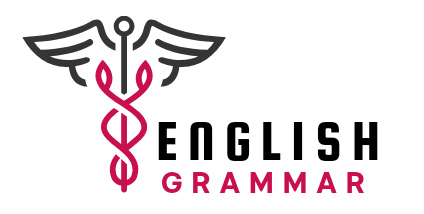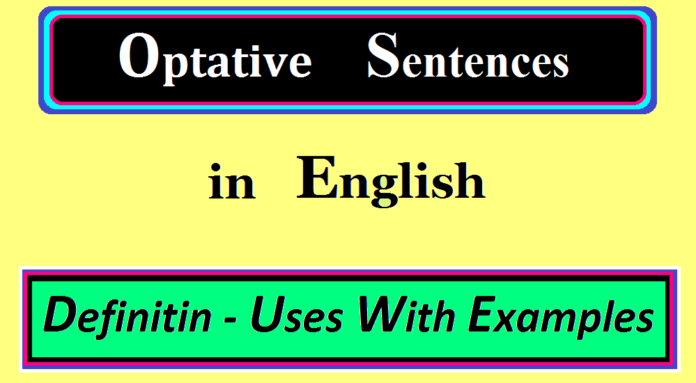Uses of Optative Sentences Expressing Wishes, Prayers, Blessings, Regrets, and Hope . Examples of Optative Sentences in English Definition.
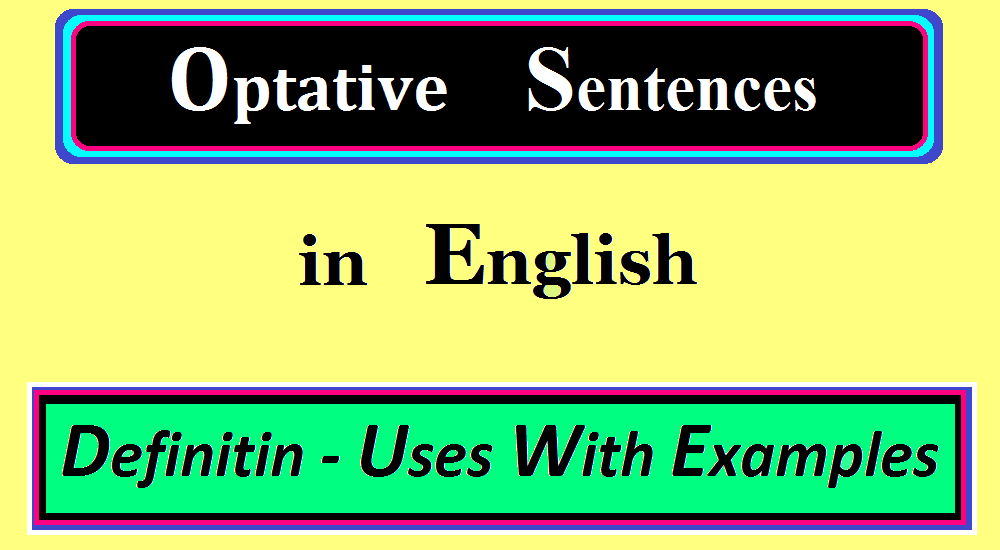
In this article, you will find the optative sentence definition, structure, and uses with examples. By the end, you will feel confident using them to express your wishes and hopes.
Definition of an Optative Sentence:
The sentence that expresses a wish, hope, or prayer is called an optative sentence. It usually starts with words like (“May” or “Wish”) and ends with an exclamation mark depending on the intensity of the emotion.
What Is an Optative Sentence In English?
An optative sentence is a type of sentence in English that is used to express a wish, hope, blessing, or prayer in daily conversations. It reflects the speaker’s desire for something to happen.
These sentences often express goodwill or wishes for someone. Writers and poets often use these sentences to add emotional depth to their work.
For Example:
- May your dreams come true!
- Wish you success in your struggle!
- May you live a long and happy life!
- Wish you all the best for your journey!
- May he long live the king!
These are examples of optative sentences that help us share our deepest desires and heartfelt feelings.
The Structure Of Optative Sentences
Whether you’re wishing someone well, these sentences have a unique way of adding warmth and depth to what you say. If you’re expressing a wish, hope, or prayer, the optative sentence structure will be.
1. Sentences Starting With (May)
Structure: May + subject + verb
For Example: May your dreams come true!
This structure is commonly used in blessings and good wishes.
2. Sentences Starting With (Would That)
Structure: Would that + subject + verb
For Example: Would that I had more time to help you!
This structure expresses regret about something that is not reasonable.
3. Sentences Starting With (Long Live)
Structure: Long live + noun (subject)
For Example: Long live our heroes!
This structure expresses praise or hope for someone’s performance or achievement.
4. Sentences Starting With (If Only)
Structure: If only + subject + verb (in past tense)
For Example: if only I could go back in time.
This structure conveys wistfulness, indicating a great desire for something to happen.
Each structure of optative sentences types has its own specific fragrance, offering you many choices for matching the tone and context of your message. These words do not explain facts or represent questions but rather communicate trust or kindness in a sincere way.
Uses of Optative Sentences with Examples
Optative sentences in English grammar are used to convey wishes, hopes, or prayers. While less common as declaratives or interrogatives, they carry a lot of emotional weight.
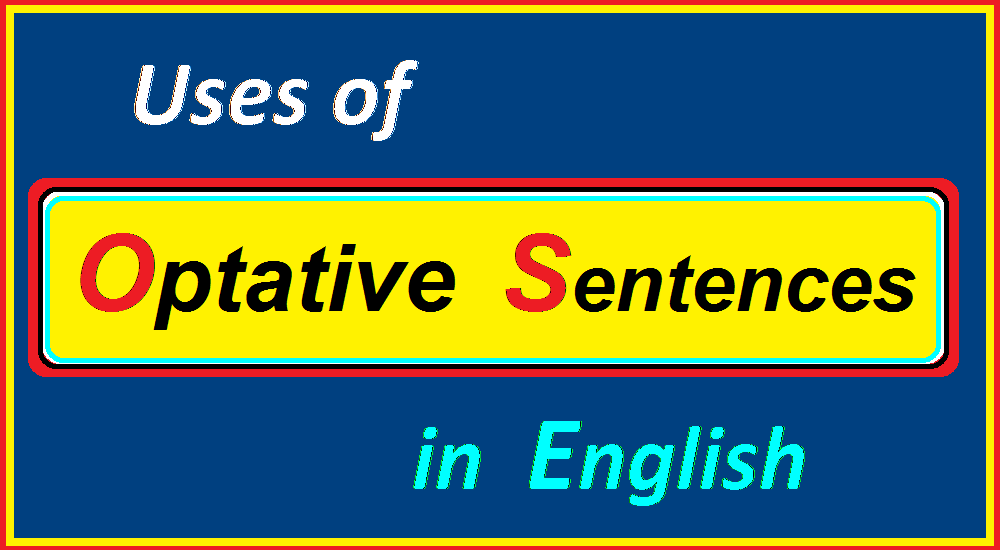
People use them in talks, speeches, cards, and even on social media to communicate their sincere wishes for someone’s well-being.
1. Optative Sentences Expressing Wishes
Wishing someone success is one of the most common uses of optative sentences. Whether it is a birthday, celebration, or just a moment of caring, these sentences express your hopes for someone.
Wishing Sentences Examples:
Wish sentences often express heartfelt feelings, from well-wishes for someone to personal wishes. Here are examples of optative sentences when expressing wishes.
- May you have a wonderful day ahead!
- May you always stay happy and healthy!
- May your life be full of joy!
- May you achieve everything you desire!
- May love and kindness fill your heart!
- May the best opportunities come your way!
- May your friendships become stronger over time!
- May you get strength in moments of weakness!
- May your health always be at its finest!
- May you always be humble and kind!
- May your patience bring you success!
- May your efforts be noticed by everyone!
- May your life be as gorgeous as a rising flower!
- May you gain wisdom from life experiences!
- May your heart be forever free of stress!
These examples of wishing sentences in English are simple and easy to understand wish situations.
2. Optative Sentences Offering Blessings
In religious or social groups, blessings are frequently expressed as blessing sentences. Such sentences are essential in ceremonies, prayers, and traditional greetings, especially weddings. The actions of kindness are strong and significant, having spiritual senses.
Blessings Sentences Examples:
These sentences offer blessings; they have a positive and heartfelt tone, often intended to bring happiness, comfort, or success to others. Here are examples of optative sentences when expressing blessings;
- May you find happiness in all you do!
- May your health always be strong!
- May your hard work bear sweet fruit!
- May your home be a haven of peace!
- May your wishes come to life!
- May your goodwill transform the world!
- May you achieve all of your ambitions!
- May your struggles result in great outcomes!
- May your relationships be healthy and loving!
- May your words provide consolation to others!
- May you always solve your problems!
- May your good acts return to you!
These examples of blessing sentences in English have a positive and heartfelt tone.
3. Optative Sentences Expressing Regrets
When these sentences express regret, they convey deep feelings of sorrow or longing for something that didn’t happen or something that went wrong. They reflect the feelings associated with missed opportunities by giving voice to ideas that many people directly struggle to express.
Regrets Sentences Examples:
Regret sentence expresses regret for past decisions or actions. Here are examples of optative sentences when expressing regrets.
- If only I could turn back time!
- If only I hadn’t wasted my time on trivial matters!
- Wish I had listened to my parents’ advice!
- Would that the world became a better place for all to live in!
- Oh, if only I had apologized sooner!
- If only I had been more careful with my choices!
- Would that the rain stop so we could go outside!
- Wish I had used my time better!
- Oh, that I had taken that chance!
- Wish I had taken care of my health first!
- Would that we had more time to enjoy this moment!
- If only I had worked harder to achieve my goals!
- Oh, how I regret not being honest with myself!
- Would that I could turn back time and fix everything!
- Oh, I regret not trusting myself more!
- If only I had been more attentive!
- If only I had said “thank you” more often!
- Oh, how I regret not standing up for what was right!
- If only I hadn’t been so afraid to take risks!
- If only I hadn’t given up so easily!
- Would that I could travel the world with no limits!
- If only I had spent more time outdoors!
These examples of regret sentences in English show feelings of regret in different scenarios.
4. Optative Sentences Giving Hope:
Hope is a gift we can give freely. After all, a good hope can light one’s way. Optative sentences for expressing hopes or aspirations are also great.
Hope Sentences Examples:
Such sentences give comfort and strength in difficult times. Here are examples of optative sentences when expressing hope.
- May your life be full of happiness!
- May hope never leave your heart!
- Long live the power of knowledge!
- May you always have faith in yourself!
- Long live the unity of humanity!
- May your family always be united and happy!
- May the sun shine brighter in your life!
- Long live our beautiful Earth!
- May every morning bring new hope!
- Long live the hope in every heart!
- May your journey be filled with blessings!
- Long live peace in the world!
- May your hard work bring you amazing results!
- Long live the beauty of nature!
- May your patience bring you wonderful surprises!
- Long live our freedom!
- May hope be your constant companion!
- Long live the equality of all people!
- May we live in a world free from hate and conflict.
These examples of hope sentences in English reflect hope, goodwill, and positivity.
5. Optative Sentences Giving Prayers
Religious texts, festivals, and personal prayers commonly utilize optative language. These words express our deepest hopes and connect us to something greater than ourselves.
Prayer Sentences Examples:
Prayers sentences uttered in gatherings carry the spirit of faith and devotion. Here are examples of optative sentences when expressing prayers.
- May you live a long and happy life!
- May peace fill your heart forever!
- May your family always be united!
- May your love for others grow each day!
- May your dreams shine like stars!
- May your efforts always lead to success!
- May your heart never lose hope!
- May you find relaxation with each step you take!
- May you always remain at peace in your soul!
- May your efforts result in bigger things!
- May you find beauty in every new day!
- May your heart be always full of love!
- May your dreams take you to great places!
- May you always have rest in your heart!
These examples of prayer sentences in English show prayers full of positivity, love, and hope.
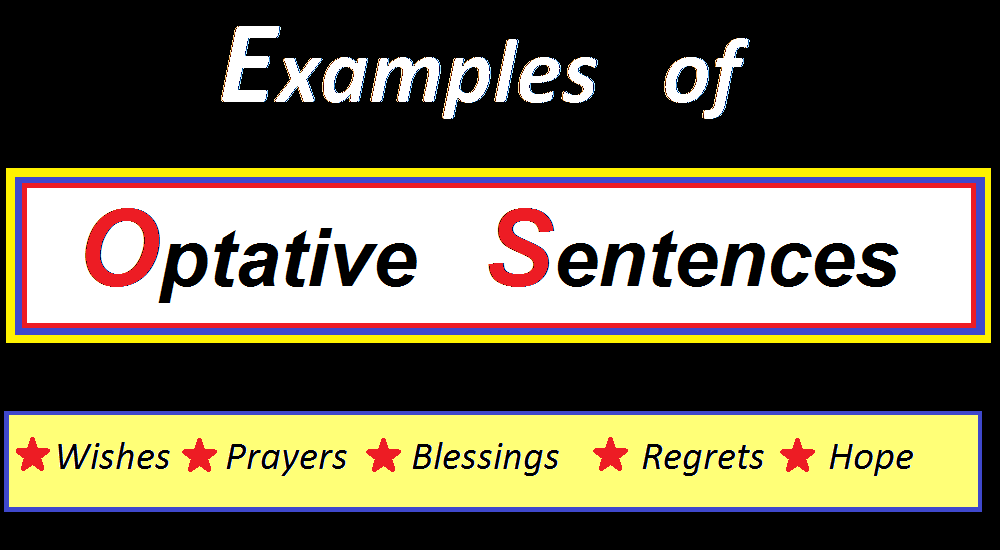
Wishes, prayers, blessings, regrets and hope sentences are used in everyday conversation, greetings, and literature, showing the universal human need to express concern and generosity.
Conclusion:
Forming and using optative sentences helps us express our deepest wishes, prayers, blessings, and hopes in ways that bring us closer to each other. They convey positive emotions more effectively by adding a touch of sincerity to your words.
By understanding how they work, you will improve your communication and make your language more emotional.
